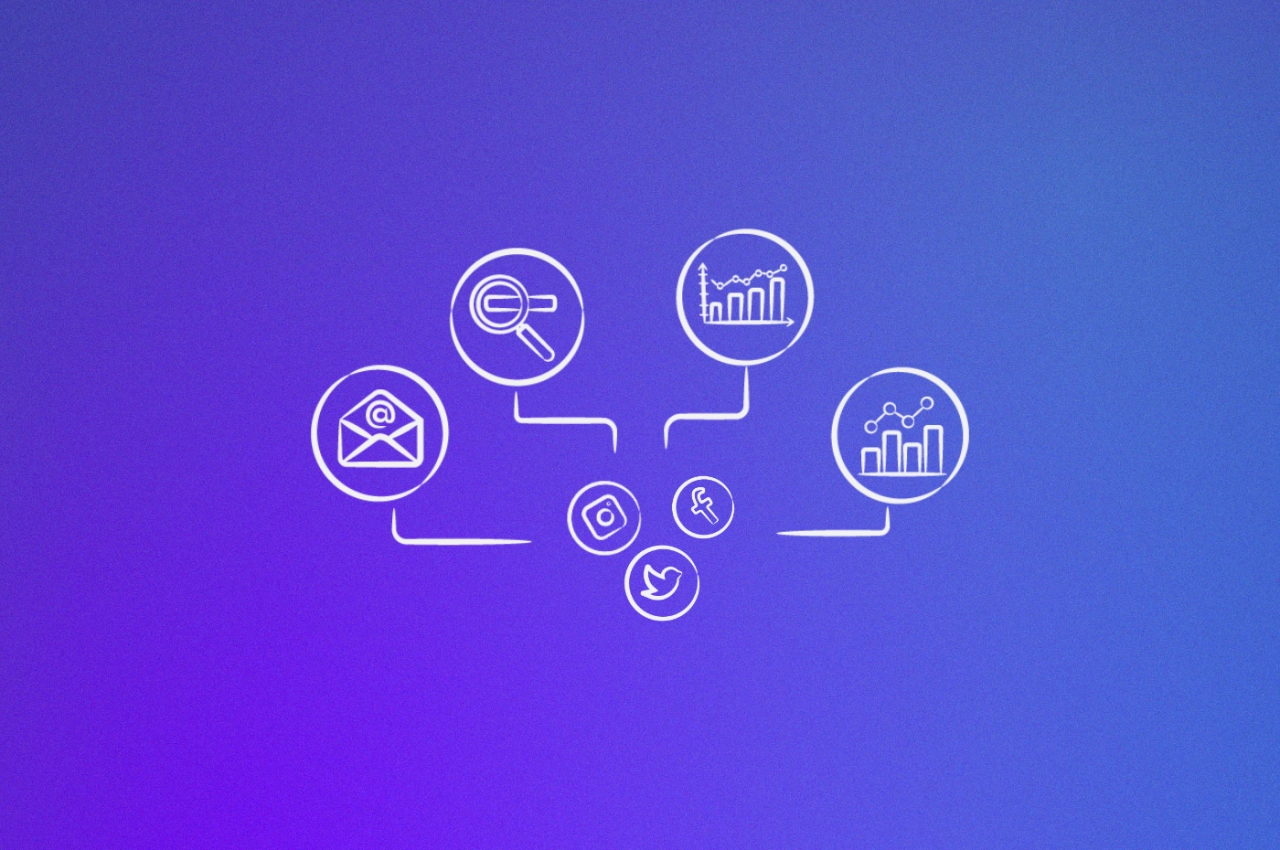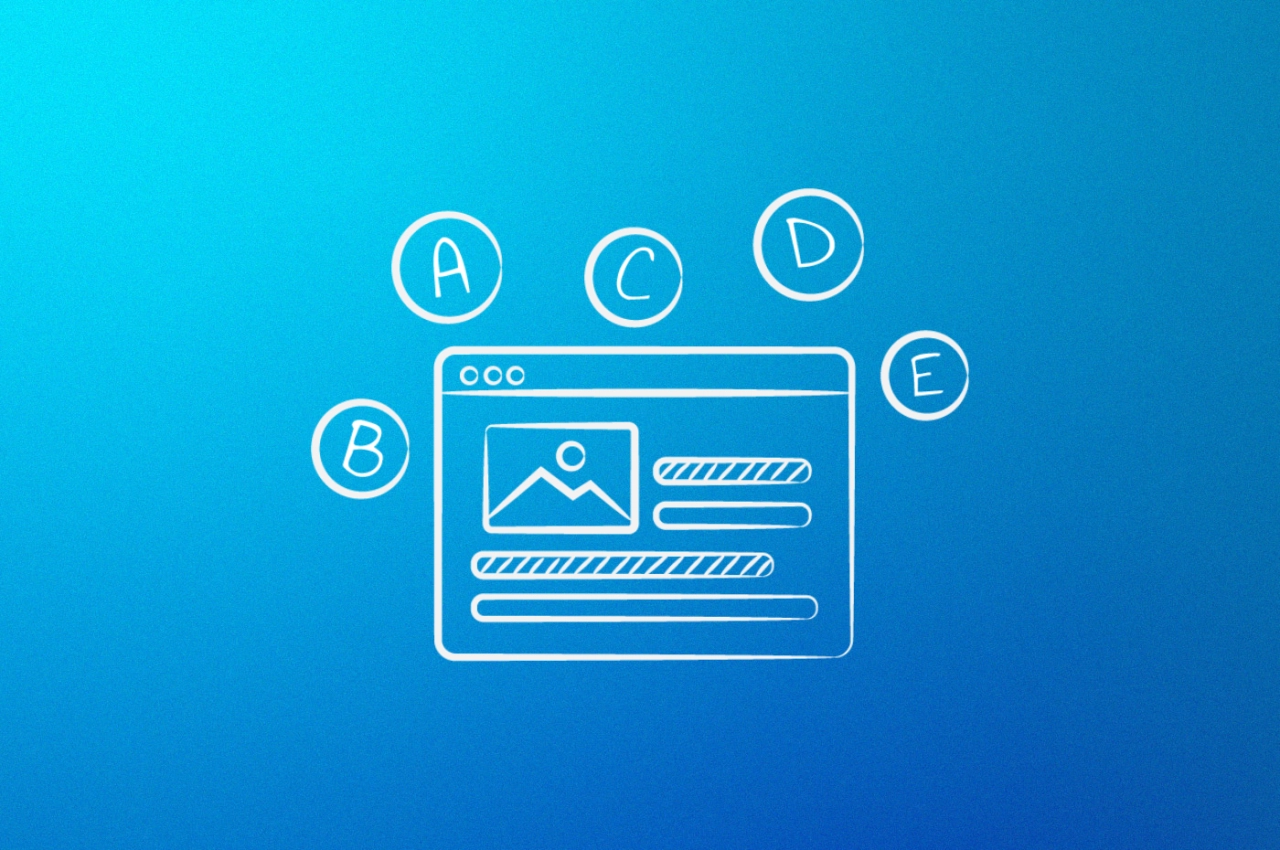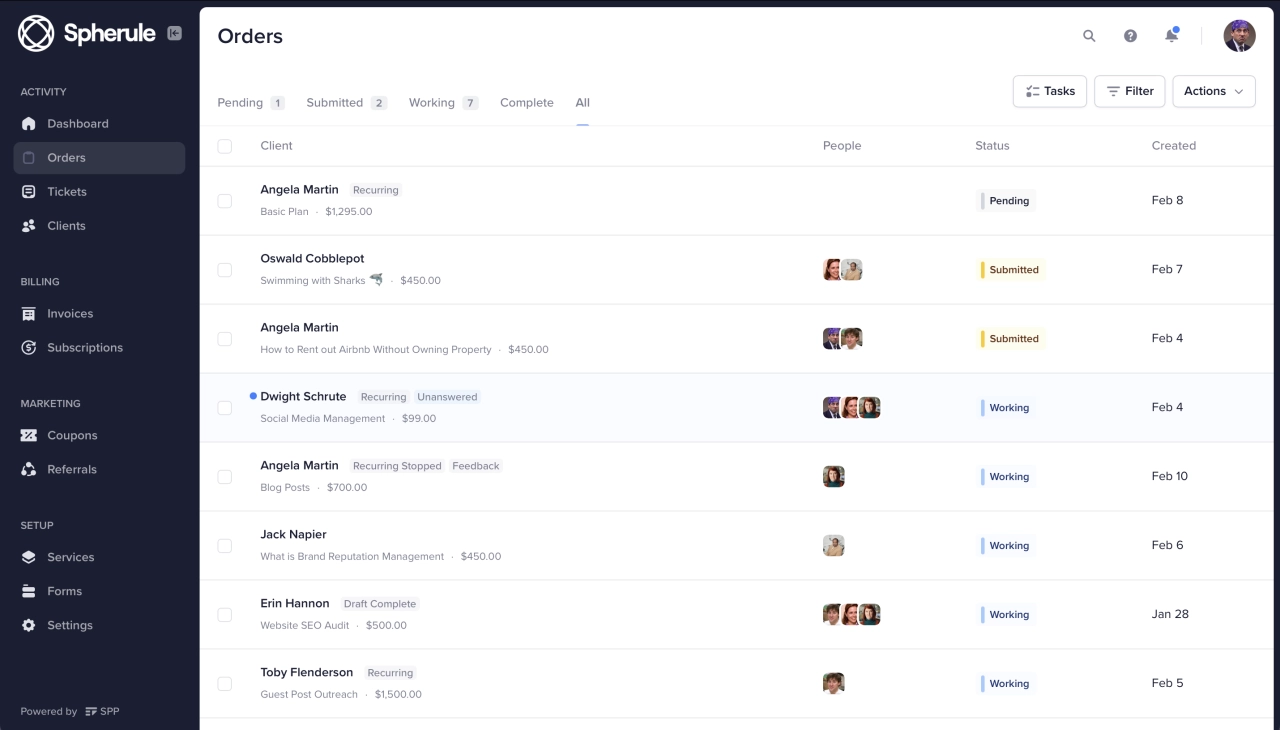- Niche agencies close faster, charge more, and attract better-fit clients by focusing on a specific market instead of competing on price with generalists.
- The best niches sit at the intersection of what you do (service type) and who you do it for (industry vertical)—validate demand before you commit.
- Clear packaging, simple systems, and targeted outreach get you to your first clients faster than a perfect website or broad marketing.
How often do you get on a call with a prospect who’s already talked to three other agencies offering the same thing?
When you’re competing with everyone, the only lever left is price. You end up chasing leads who don’t value what you do, writing custom proposals that go nowhere, and wondering why agencies half as good are growing faster.
The difference is usually positioning. Agencies that pick a specific market—and stick with it—get found by the right clients, close faster, and don’t have to justify their rates.
This guide covers how to build a productized agency, whether you’re starting from zero or tightening the focus of one you already run.
Understanding this topic involves several interconnected concepts:
- Retainer Model
- White Label Partner
- Client Portal
- Productization
- CRM (Customer Relationship Management)
- Niching
Each of these concepts plays a crucial role in the overall topic.
Why niche agencies win
Most agency owners know niching is smart but hesitate anyway. Let’s look at what actually changes when you commit to a market.
The generalist trap
When you offer “digital marketing services,” you’re competing with every other agency that says the same thing. The only differentiator left is price.
Generalist agencies also burn time on proposals. Every project requires custom scoping because there’s no standard offering. You spend hours writing proposals for leads who are comparing you against five other agencies, all promising similar things at similar prices.
Referrals fall flat too. When a client likes your work, they don’t know who to send you. “They do marketing” doesn’t stick in anyone’s head. There’s no clear reason to recommend you over any other agency.
What changes when you niche
When you focus on a specific market, the day-to-day of running your agency gets easier. Marketing becomes straightforward because you know exactly where your clients hang out—which communities, podcasts, and events actually matter for your niche. You’re not spreading yourself thin trying to be visible everywhere.
Pricing gets easier too. Specialists charge more than generalists—and clients expect it. In a ConsultingSuccess study of nearly 1,000 consultants, 52% of specialists charged $10K+ per project compared to just 18% of generalists. A “B2B SaaS content agency” can charge double what a generic “content agency” charges because the client knows you understand their world.

Referrals start working the way they’re supposed to. When someone asks your client “know anyone who does SEO for Shopify stores?” you’re the only name that comes to mind. You’re not competing with a mental list of five other agencies.
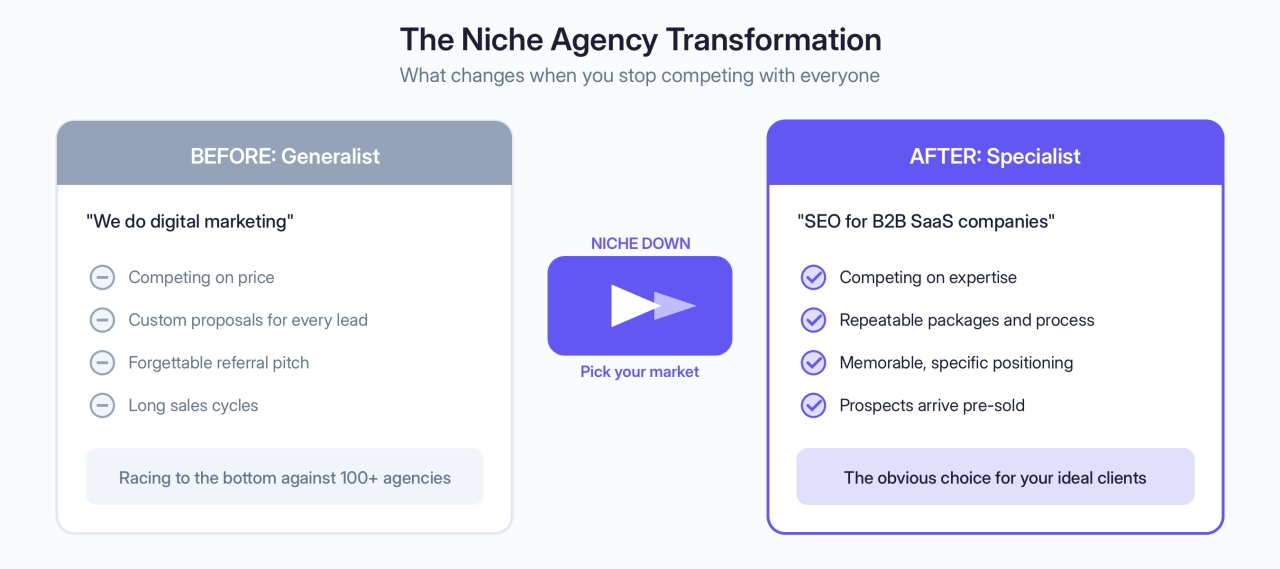
Sales cycles get shorter. Prospects show up already half-convinced because your positioning answered their first question before they even got on a call: “do these people understand my business?”
Generalist | Niche Agency |
|---|---|
“We do digital marketing” | “SEO for B2B SaaS companies” |
Competes on price | Competes on expertise |
Chases any lead | Attracts the right clients |
Custom proposals every time | Repeatable sales process |
Common fears about niching
Three objections come up in every niching conversation—even though 84% of agencies now identify as specialists:
What if I pick wrong? Then you adjust. Most successful agencies refined their niche over time based on what worked. Starting focused and adjusting beats starting broad and hoping something sticks.
What about my current clients? You don’t have to fire anyone. Finish your existing projects, keep clients who are happy, and niche your marketing—not your roster. New leads come from your focused positioning; existing relationships run their course naturally. Most agencies find that within 12–18 months, their client base has shifted without any awkward breakup conversations.
I’ll limit my market. That’s the point. A smaller pool of better-fit clients beats a giant pool where you’re competing on price with hundreds of generalists. Dennis Consorte, who runs digital marketing consultancy Consorte Marketing, explains the dynamic well.
Find that one thing you can do better than everyone else and focus your energy on that. Use that solution to get new clients who have that specific need. Then, do an amazing job and they’ll expand their scope.
 Dennis Consorte,
Consorte Marketing
Dennis Consorte,
Consorte Marketing
How to choose your niche
There’s no formula that spits out your ideal niche. But there is a process that gets you to a solid starting point.
Two dimensions of niching
Your niche sits at the intersection of two things: what you do and who you do it for.
Service type is the skill or deliverable—SEO, link building, content, paid ads, social media management, web development, email marketing. This is usually where people start because it’s what they already know how to do.
Industry vertical is the market you serve—SaaS, ecommerce, healthcare, legal, real estate, hospitality, local businesses. This is usually what separates you from agencies offering the same service.
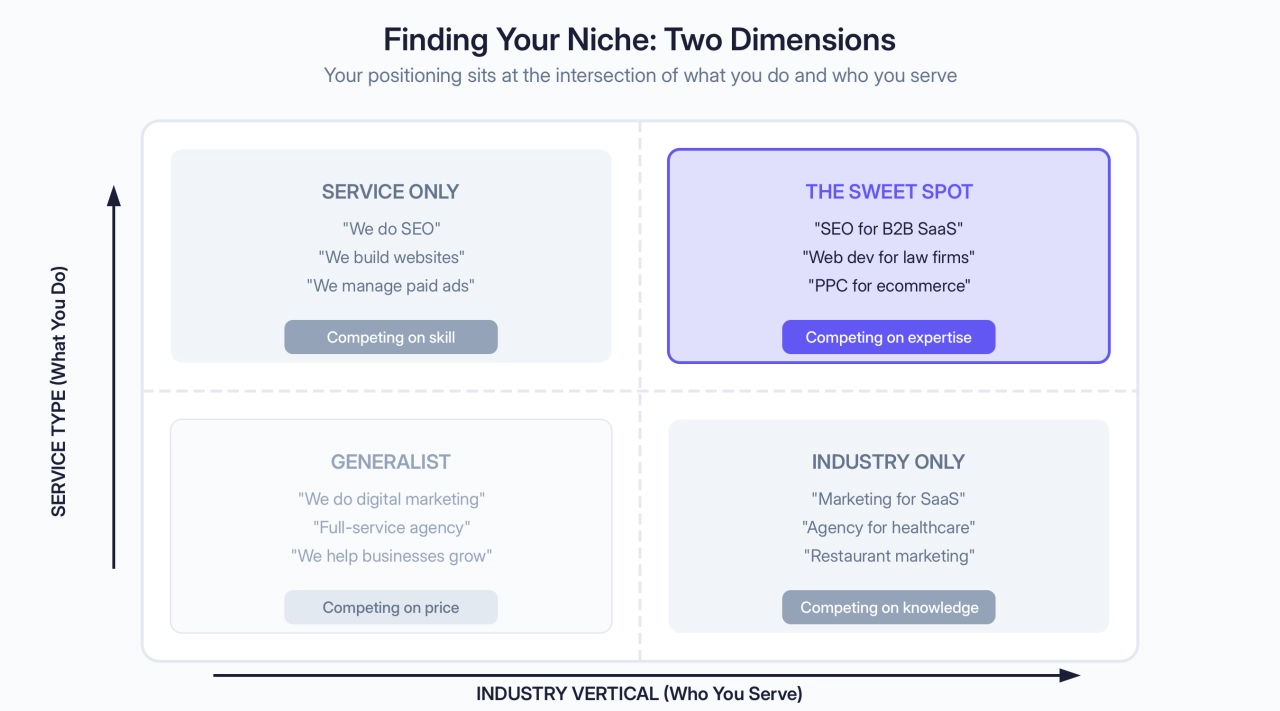
The best niches combine both. “Content marketing for B2B SaaS” is stronger than “content marketing” which is stronger than “digital marketing.” Each layer of specificity makes you more findable and more credible to the people who need exactly that.
Finding the intersection
Four questions to narrow it down:
What have you done well before? Look at past client work. Which projects got the best results? Which clients were easiest to work with? There’s usually a pattern.
What do you actually enjoy? You’re going to do a lot of this work—or at least manage people doing it. If you hate the service or the client type, the business becomes a grind fast.
Where is there demand? Passion projects don’t pay bills. You need people actively looking to buy what you’re selling. More on how to validate this below.
Where is competition manageable? You don’t need a market with zero competition—that probably means zero demand. But you also don’t want to fight established players with ten years’ head start and massive budgets.
As we shifted our focus to the legal industry our entire infrastructure grew around what worked for law firms. The question to ask yourself when finding your niche is, ’Who has the most to gain from my offering?
 Jason Bland,
Custom Legal Marketing
Jason Bland,
Custom Legal Marketing
If you’re starting with no client history at all, lean harder on the last two questions. Pick an industry you already understand—from a past job, a side interest, or a field where you’ve spent time as a customer—and validate demand before you commit.
Validating before you commit
Before you build a website and print business cards, do some basic checks:
Search volume: Look up “[your niche] + agency” in a keyword tool such as Ahrefs. If nobody’s searching for it, that’s a red flag. Doesn’t need to be huge volume—a few hundred monthly searches can support a solid agency—but it shouldn’t be zero.
Competitor analysis: Google your niche. Who shows up? If it’s all giant agencies or directories, breaking in will be hard. If it’s a few focused players with decent but not dominant positioning, there’s room.
Talk to potential clients: Find 5–10 people who match your ideal customer profile. Ask what they struggle with, how they’re solving it now, and whether they’d pay for what you’re considering. This takes a few hours and saves months of building the wrong thing.
Check job boards: Are companies hiring in-house for this skill? That’s a sign of demand. It also tells you what they’re willing to pay and what they expect.
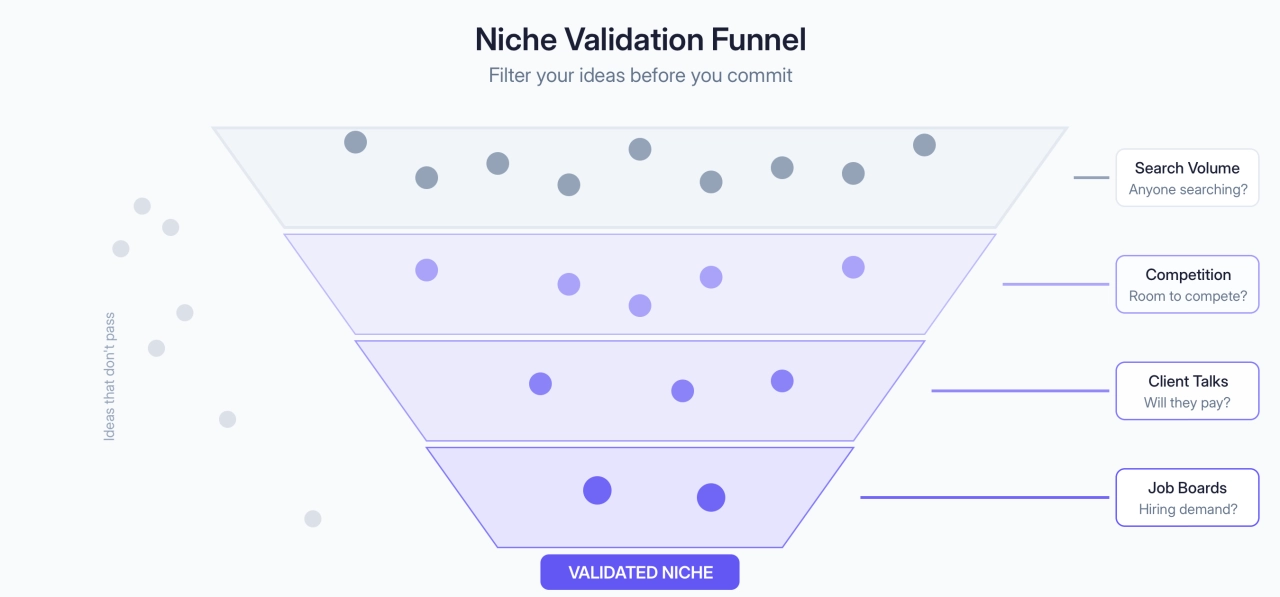
Real examples of niche positioning
A few agencies that got this right:
SMG niched down to WooCommerce and Shopify maintenance. Not web development broadly—just ongoing support for two specific platforms. Clients come in already knowing SMG understands their stack.
WP Speed Fix focuses exclusively on WordPress and WooCommerce speed optimization. Not general dev work, not hosting, not SEO—just making slow sites fast. That specificity makes them the obvious choice when someone’s site is lagging.
100 Pound Social offers affordable, fixed-price social media packages for small businesses. They didn’t try to compete with big agencies on strategy consulting—they packaged a simple, repeatable service for a specific budget range.
Reachly built a lead generation agency focused on APAC markets. After six months of crickets on Fiverr, they niched into a region most agencies ignore—and grew to 50+ clients across six countries.
None of these are complicated. They just picked a lane and stuck with it.
Types of agencies you can start
You don’t need to invent a new category. Most successful agencies fall into one of a few proven models.
Service-based niches
These are defined by what you deliver:
Niche | Core Services | What to Know |
|---|---|---|
SEO agencies | Rankings, traffic, technical audits | Clients usually come in after content alone didn’t work |
Link building agencies | Outreach, digital PR, backlink acquisition | Often works as a white-label service for other agencies |
Content agencies | Blog posts, copywriting, content strategy | Industry expertise or a specific format is the usual differentiator |
Social media agencies | Posting, community management, paid social | Clients expect a real social media strategy, not just posting |
PPC agencies | Google Ads, Meta ads, paid media buying | Results show fast, which makes proving value easier |
Web development agencies | Builds, maintenance, migrations | Maintenance retainers often become the real business |
Email marketing agencies | Campaigns, automation, deliverability | Pairs well with content or lead gen services |
Each of these can support a full business. Most successful agencies start with one and expand later—if at all.
Industry-based niches
These are defined by who you serve:
SaaS and software companies
ecommerce and DTC brands
healthcare and medical practices
legal firms
real estate and property
local service businesses
restaurants and hospitality
Industry niches work because clients want someone who understands their world. A healthcare marketing agency doesn’t need to explain HIPAA compliance on every call. An ecommerce agency already knows the difference between Shopify and WooCommerce.
The hybrid approach
Agencies that combine both tend to be easier to market and sell:
“SEO for ecommerce” instead of just “SEO”
“Social media for restaurants” instead of just “social media management”
“Content marketing for B2B SaaS” instead of just “content”
You don’t have to go this specific on day one. But the tighter your focus, the easier everything else becomes—marketing, sales, hiring, delivery.
Pick what you know, validate that people will pay for it, and start there. You can always expand once you’ve owned your corner.
Set up your business
Once you’ve picked your niche, the operational stuff is straightforward. Don’t overthink it.
Choose your business structure
For most new agencies in the US, there are three realistic options:
Structure | Best For | Liability | Taxes |
|---|---|---|---|
Sole Proprietorship | Testing an idea before committing | You’re personally liable for everything | Income passes through to personal taxes |
LLC | Most new agencies | Personal assets protected | Flexible—can elect S-corp taxation later |
S-Corp | Established agencies ($80k+ profit) | Personal assets protected | Can reduce self-employment taxes |
The short version: Start as an LLC. It’s cheap to set up, protects your personal assets, and gives you flexibility. Once you’re consistently profitable above $80k/year, talk to an accountant about S-corp election.
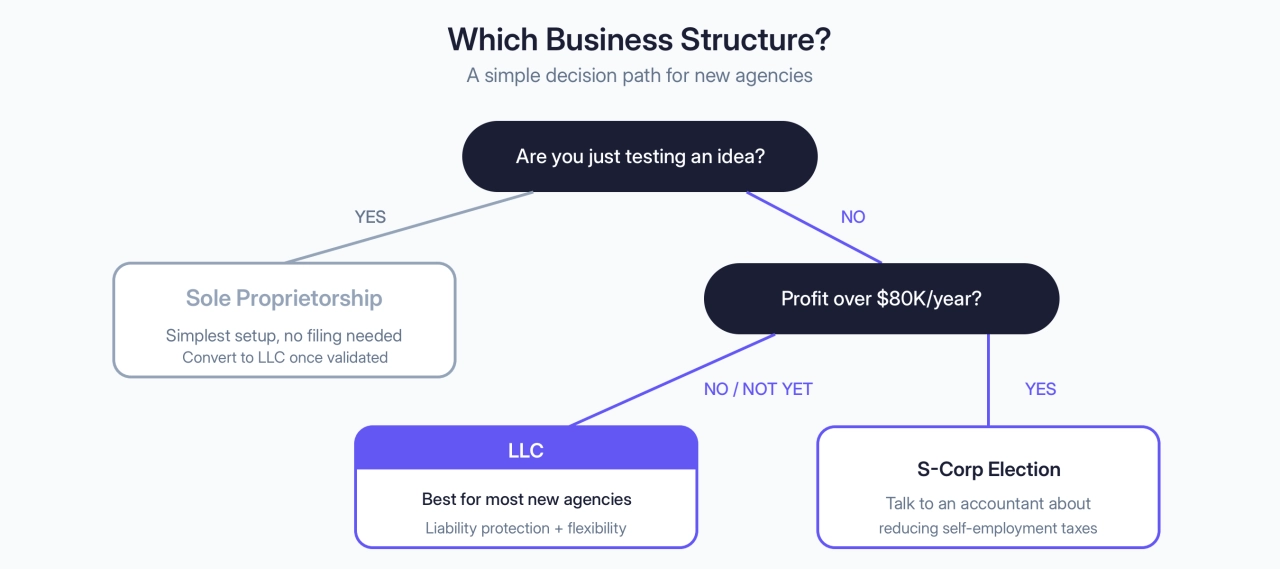
If you’re outside the US, the structures differ but the principle is the same: get some liability protection before you have clients.
Legal essentials
You don’t need a lawyer on retainer, but you do need a few basics:
Register your business. File with your state—usually the Secretary of State’s office. This costs $50-500 depending on where you live. If you’re unsure which type of business structure makes sense, LLC is the safe default for most new agencies.
Get an EIN. This is your business tax ID. It’s free from the IRS and takes five minutes online.
Open a business bank account. Keep your business money separate from personal. This makes taxes easier and looks more professional when clients pay you.
Have a basic contract. You need something that covers scope, payment terms, and what happens if things go sideways. A master service agreement (MSA) plus project-specific statements of work (SOW) is the standard setup. You can find templates online or pay a lawyer a few hundred dollars to draft one.
Consider insurance. General liability and professional liability (errors & omissions) are worth having once you’re signing contracts and taking on real client work. Not urgent while you’re still validating, but get it in place before you’re handling significant budgets or deliverables that could go wrong.
Financial foundations
Three things to set up early:
Accounting software. QuickBooks, Xero, or Wave. Pick one. Connect it to your bank account. Categorize expenses as they come in, not once a year when you’re panicking about taxes.
Payment processing. You need a way to charge clients—especially for recurring billing if you’re doing retainers. Stripe and PayPal are the defaults. SPP handles this natively if you’re using it for client management.
Tax savings. Set aside 25–30% of everything you earn. Put it in a separate account and don’t touch it. Quarterly estimated taxes are a thing, and they’ll catch you off guard if you’re not prepared.
None of this is exciting. But getting it right early means you’re not scrambling to fix it later when you’re busy with actual client work.
Package your services
How you structure your offering matters as much as what you deliver. Clear packaging makes everything easier—sales, delivery, hiring.
Why packaging matters
When clients understand exactly what they’re buying, they say yes faster. No back-and-forth about scope. No confusion about what’s included. The price is the price.
It also makes your life simpler. You’re not reinventing delivery for every project. Your team knows what to do because they’ve done it before. You can actually estimate profitability because the inputs are predictable.
Agencies that sell “custom solutions” spend half their time scoping and quoting. Agencies that sell packages spend that time delivering and getting paid.
Common packaging models
Model | Example | Best For |
|---|---|---|
Monthly retainer | $2,500/mo for ongoing SEO | Continuous services with recurring deliverables |
Project-based | $5,000 website audit | Defined scope with clear start and end |
Tiered packages | Basic ($1k) / Pro ($2.5k) / Premium ($5k) | Letting clients self-select based on needs and budget |
If you’re struggling to set your prices, use our calculator:
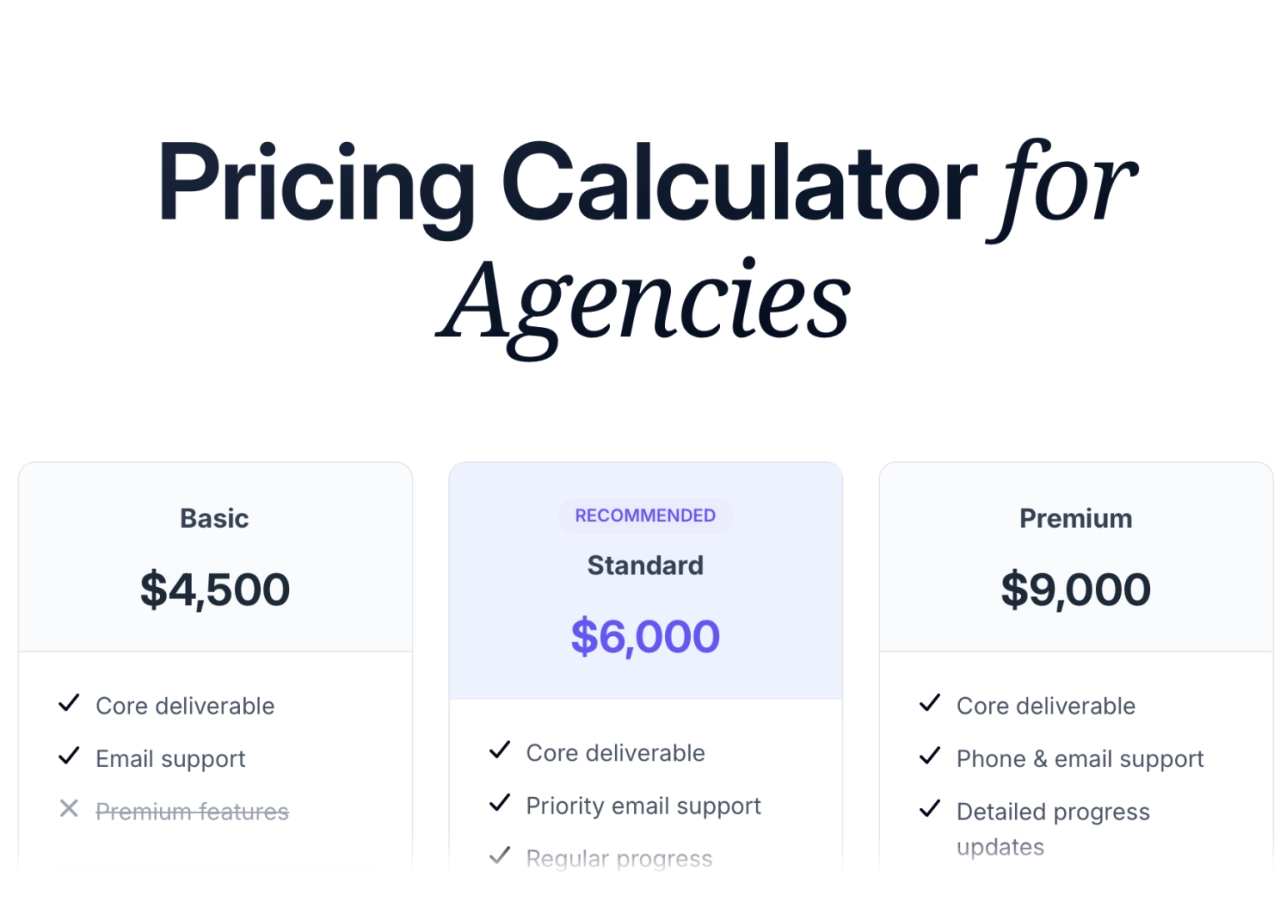
Generate tiered packages for your agency.
Most niche agencies land on retainers or tiered packages. Predictable revenue, predictable workload, easier to plan around.
The productized approach
If you want to take packaging further, full productization is the end goal: fixed scope, fixed price, standardized delivery. Every client gets the same thing, delivered the same way.
This turns your agency from a service business into something closer to a product business. You’re not selling your time—you’re selling an outcome.
We’ve written extensively about how to do this well:
How to Productize a Service: the full framework
13 Productized Services That Work: real examples across different niches
You don’t have to go fully productized on day one. But the closer you get to repeatable, standardized offerings, the easier it is to scale.
Build your tool stack
You don’t need much to start. A few core tools, set up properly, will handle most of what you need until you’re well past your first ten clients.
The essentials
Here’s what you actually need to run a niche agency from day one:
Function | Tool | Cost | Why |
|---|---|---|---|
Client portal & billing | SPP | From $129/mo | Built for productized agencies—handles orders, invoices, and client communication in one place |
Project management | Asana, Trello, or Notion | Free to start | Track what’s due and who’s doing it |
Team communication | Slack | Free to start | Keep internal chat out of email |
Accounting | QuickBooks or Xero | From $15-30/mo | Invoicing, expenses, tax prep |
That’s it to start. Four tools. You can add more later, but most agencies overcomplicate this early on and end up paying for software they barely use.
Add later as you grow
Once you have steady clients and some revenue:
CRM: When you’re juggling more leads than you can track in your head or a spreadsheet, add a proper CRM. HubSpot’s free tier works. Pipedrive is simple. Keep it simple.
Reporting dashboards: Clients like seeing results without asking for them. Looker Studio (free) or AgencyAnalytics (paid, but built for agencies) let you build dashboards they can check anytime.
Automation: Zapier connects your tools so things happen without you doing them manually—new client signs up, gets added to your project management tool, welcome email goes out. Worth setting up once you’re doing the same tasks repeatedly.
Documentation: Loom for video SOPs, Notion for written processes. You’ll need these before you hire anyone.
The integration principle
Pick tools that work together. If your client portal talks to your accounting software and your project management tool, you’re not copying data between systems. SPP.co integrates with Zapier, Stripe, MailChimp, and most of the common agency tools—that’s by design.
The goal is a system where client work flows through without you touching every step. You’re not there on day one, but build with that direction in mind.
Land your first clients
This is where most people stall. The niche is picked, the LLC is filed, the website is up—but no one’s buying.
Getting your first clients is different from getting your hundredth. You don’t have case studies, testimonials, or a reputation yet. You have to earn attention the hard way.
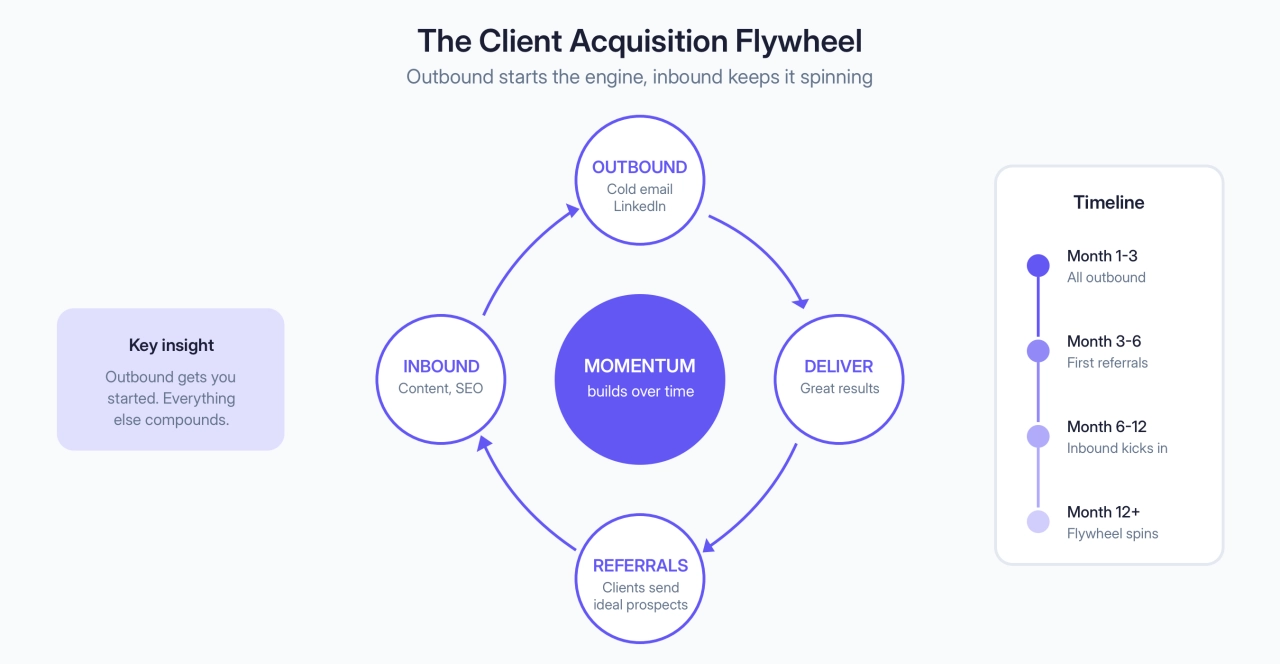
Before you have a portfolio
You probably have more to work with than you think.
Past work counts: If you’ve done freelance or in-house work in your niche, that’s your portfolio. Rebrand it. “I did this at my last job” or “I did this for a freelance client” is fine. You did the work—own it.
Offer a few projects at a discount: Not free, but discounted—in exchange for a testimonial and case study. Two or three of these gives you enough proof to sell at full price. Don’t do more than that or you’re just running a cheap agency.
Partner with adjacent agencies: If you do SEO, find a web dev shop that doesn’t. They have clients who need what you do. You send them clients who need what they do. It’s a simple exchange that benefits both sides.
Outbound that works
Cold outreach has a bad reputation because most people do it badly. Generic templates, no personalization, sprayed to a thousand people. That doesn’t work.
What works:
Personalized cold email. Research the prospect. Reference something specific about their business. Explain the problem you solve in their context. Keep it short. One clear ask. Three to five sentences: observation about their business, problem you solve, ask for a 15-minute call. If you’re writing more than that, you’re writing too much.
LinkedIn outreach. Same idea—personalized, specific, short. Connect with a note that isn’t “I’d love to add you to my network.” Comment on their posts before you pitch. Build some familiarity first.
Show up where your clients are. Facebook groups, Slack communities, industry forums. Search “[your industry] + Facebook group” or “[your industry] + Slack community” to find where they’re already talking. Answer questions. Be helpful without pitching.
Inbound that compounds
Outbound gets you started. Inbound keeps you fed long-term.
Content marketing. Write about what you know for the audience you serve. It takes months to pay off, but once it does, leads come to you already warmed up.
SEO for your niche. Rank for “[your service] for [your industry]” and you have a lead source that works while you sleep. Takes time to build, but worth the investment.
Directories. Clutch, agency directories, industry-specific listings. Low effort, occasional leads. Worth being listed even if it’s not your primary source.
Being at the top of Google has been astounding. It seems that 50% of the sale is done when we get on calls with the prospect. Some trust has already been gained. They have seen what we have to offer on the website and how we have already helped others, just like them, solve a particular problem.
 Ben Hughes,
Web Design Essex
Ben Hughes,
Web Design Essex
Closing the deal
Getting a lead isn’t the same as getting a client. You still have to close.
Discovery calls. Your goal is to understand their problem and decide if you can help. Ask more than you pitch. If it’s a fit, say so. If it’s not, say that too—referring out a bad-fit lead builds more trust than taking on work you’ll regret.
Proposals. Keep them simple. What you’ll do, how long it takes, what it costs, what’s included, what’s not. Don’t bury the price at the end. If your positioning is right, the price shouldn’t be a surprise. A clean proposal template helps if you’re not sure how to structure it.
Handling “can you customize this?” Steer back to your packages when possible. “We’ve found this approach works best for [your niche] because…” If they really need something custom, charge accordingly—or refer them elsewhere.
Build your team
You don’t need a team to start. But at some point, you’ll hit a ceiling—either on time or on skills—and you’ll need help.
Start with contractors
Full-time employees are expensive and hard to undo. Contractors let you scale up when work is busy and scale down when it’s not.
For most agencies, the first hire isn’t a hire at all—it’s a contractor who handles delivery. You stay focused on sales and client relationships. They do the work.
Where to find them:
Upwork for general skills, though quality varies
referrals from other agency owners (usually the best source)
niche communities where specialists hang out—SEO Twitter, design Slack groups, developer forums
Vet them on a small project before giving them anything important. Check their communication as much as their output. A great deliverable means nothing if getting updates is like pulling teeth.
First roles that matter
When you’re ready to build beyond yourself, these are the roles that typically come first:
Delivery specialist: Someone who does the actual work—writing, design, SEO, whatever you sell. This is usually the first contractor you bring on.
Project or account manager: Someone who talks to clients so you don’t have to be in every conversation. This role becomes critical once you have more than five or six active clients.
Operations: Someone who handles the back-office stuff—invoicing, onboarding paperwork, tool management. This is often you for longer than you’d like, but eventually worth handing off.
When to hire vs. outsource
General rule: hire for what you sell, outsource for what supports it.
If you run a content agency, your writers should probably be close to the business—either employees or dedicated long-term contractors. But your bookkeeper? Outsource that. Your IT support? Outsource that too.
Keep your core competency tight. Let other people handle the rest.
Scale when you’re ready
Scaling too early breaks agencies. Scaling too late leaves money on the table. Here’s how to know when it’s time.
Signs you’re ready to grow
Three signals that it’s time to add capacity:
You’re turning away work. Not bad-fit work—good work you’d take if you had capacity. If this happens more than occasionally, you’re leaving revenue behind.
Delivery quality is consistent. You’re not scrambling to fix mistakes or redo work. Clients are happy. Results are predictable. If you’re still firefighting, adding volume will make things worse, not better.
Processes are documented. You could hand someone a checklist and they could do the work without asking you twenty questions. If everything still lives in your head, you’re not ready to scale—you’re ready to document.
Growth levers
Once you’re ready, you have a few options:
Raise prices. The simplest lever. If demand exceeds capacity, your prices are too low. Raise them until you’re not turning away ideal clients.
Add capacity. Hire or contract more people to do the work. Only works if your processes are solid.
Expand services. Carefully. Adding a related service can increase revenue per client. Adding an unrelated service can undo your niche positioning.
White-label partnerships. Let other agencies sell your service under their brand. You get volume without doing sales.
For deeper frameworks on scaling, see our guides on how to scale your agency and scaling productized services.
Frequently asked questions
How much does it cost to start a niche agency?
Less than you’d think. An LLC costs $50–500 depending on your state. A basic website runs $0–200 if you do it yourself. Accounting software is $15–50/month. A client portal like SPP.co starts at $129/month. Most agencies can get started for under $1,000 in the first month.
How long until a new agency becomes profitable?
Depends on your starting point. If you have an existing network or past clients you can tap, you could be profitable in the first month. If you’re starting cold with no connections in your niche, expect 3–6 months of hustle before things click.
Can I start while still freelancing or employed?
Yes, and most people do. Take on agency clients in the evenings or weekends until revenue is consistent enough to make the jump. Just be mindful of any non-compete clauses in your current contracts.
What if my niche is too small?
You don’t need millions of potential clients—you need enough to build a sustainable business. A few hundred companies in your target market can support a solid agency. If you genuinely can’t find enough prospects, widen slightly. “SEO for vegan restaurants” might be too narrow. “SEO for restaurants” probably isn’t.
Do I need an office?
No. Most agencies under 10 people run fully remote. Clients don’t care where you work—they care about results. If you work better outside your house, get a coworking membership. But an office lease? Not until you have a reason for one.
Should I use contracts from day one?
Yes. Even with your first client. Even if it feels awkward. A basic contract protects both of you and sets professional expectations from the start. You don’t need a lawyer to draft it—plenty of templates exist online. Just make sure it covers scope, payment terms, and what happens if either party wants to end the engagement.
What do I say to leads outside my niche?
Be direct: “We specialize in [your niche], so I’m not the best fit—but I know someone who might be.” Then refer them out. You lose a bad-fit project and gain a reputation for being helpful. Those referrals often come back around.
Wrapping up
Starting a niche agency comes down to three decisions: what you do, who you do it for, and how you package it. Get those right and everything else—sales, hiring, scaling—gets easier.
The agencies that struggle are the ones trying to be everything to everyone. The ones that grow picked a lane and committed.
You don’t need more information. You need to pick your niche and land your first client.




